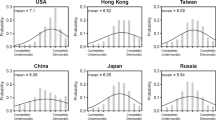Abstract
This effort seeks to expand our understanding of the supply-side of the campaign process by investigating how candidate competition for agenda control affects occurrences of issue convergence (the discussion of the same issues by competing candidates) in campaigns for the presidency. More specifically, I integrate hypotheses suggested by extant literature into a framework that captures the factors that motivate presidential candidates’ selection of issues and the factors that affect their decisions to address issues also discussed by their opponents. These hypotheses are tested with duration analysis and data gathered from all available campaign advertisements produced by candidates competing in the 1976 through 1996 presidential elections. The results indicate that occurrences of issue convergences are quite frequent in presidential campaigns and that candidates’ decisions to address the same issues are affected by an issue’s saliency and partisan ownership, as well by changes in the campaign environment.
Similar content being viewed by others
References
John A. Aldrich D. Griffin John (2003) The presidency and the campaign: creating voter priorities in the 2000 election. Michael Nelson (Eds) The Presidency and the Political System EditionNumber7 Congressional Quarterly Press Washington DC 239–256
Stephen Ansolabehere Iyengar Shanto (1995) Going Negative: How Political Advertisements Shrink and Polarize the Electorate. Free Press New York
Stephen Ansolabehere Shanto Iyengar (1994) ArticleTitleRiding the wave and claiming ownership over issues. Public Opinion Quarterly 58 335–357
Frank R. Baumgartner Bryan D. Jones (1993) Agendas and Instability in American Politics University of Chicago Press Chicago
Janet M. Box-Steffensmeier Zorn Christopher (2002) ArticleTitleDuration models for repeated events. The Journal of Politics 64 1069–1094
Janet M. Box-Steffensmeier Zorn Christopher (2001) ArticleTitleDuration models and proportional hazards in political science. American Journal of Political Science 45 972–88
Ian Budge (1993) Issues, dimensions, and agenda change in postwar democracies: longterm trends in party election programs and newspaper reports in twenty-three democracies. William Riker (Eds) Agenda Formation University of Michigan Press Ann Arbor 41–80
Paul Burstein (2003) ArticleTitleThe impact of public opinion on public policy: a review and an agenda. Political Research Quarterly 56 29–40
Dennis Chong (1996) Creating common frames of reference on political issues Diana C. Mutz Paul M. Sniderman Richard A. Brody (Eds) Political Persuasion and Attitude Change. University of Michigan Press Ann Arbor 195–224
David F. Damore (2004) ArticleTitleThe dynamics of issue ownership in presidential campaigns. Political Research Quarterly 57 391–397
David F. Damore (2003) ArticleTitleUsing campaign advertisements to assess campaign processes. Journal of Political Marketing 3 39–59
David F. Damore (2002) ArticleTitleCandidate strategy and the decision to go negative. Political Research Quarterly 55 669–685
Anthony Downs (1957) An Economic Theory of Democracy. Harper New York
Murray Edelman (1964) The Symbolic Uses of Politics. University of Illinois Press Urbana, IL
Charles H. Franklin (1991) ArticleTitleEschewing obfuscation: campaigns and perception of U.S. senate incumbents. American Political Science Review 85 1193–1214
John G. Geer (1998) Campaigns, party competition, and political advertising John G. Geer (Eds) Politicians and Party Politics. Johns Hopkins University Press Baltimore 186–217
Peter Goldman Mark Thomas M. DeFrank Andrew Miller Murr Mathews Tom (1992) Quest for the Presidency. Texas A & M University Press College Station, TX
Holbrook, Thomas M. (1996). Do Campaigns Matter? Thousand Oaks, CA: Sage Publications Iyengar, Shanto, and Donald R. Kinder (1987). News That Matters. Chicago: Chicago University Press.
Lawrence Jacobs Robert Y. Shapiro (1994) ArticleTitleIssues, candidate image, and priming: the use of private polls in kennedy’s 1960 presidential campaign. American Political Science Review 88 527–540
Gary C. Jacobson (1990) The Electoral Origins of Divided Government. Westview Press Boulder
Bryan D. Jones (1994) Reconceiving Decision-Making in Democratic Politics. University of Chicago Press Chicago
Kim Fridkin Kahn Patrick J. Kenney (1999) The Spectacle of U.S. Senate Campaigns. Princeton University Press Princeton
John Kingdon (1984) Agendas, Alternatives, and Public Policies. Little, Brown, and Company Boston
Richard R. Lau Sigelman Lee Heldman Caroline Babbitt Paul (1999) ArticleTitleThe effects of negative political advertisements: a meta-analytic assessment. American Political Science Review 93 851–876
Arthur Lupia Mathew D. McCubbins (1998) The Democratic Dilemma. Cambridge University Press New York
Richard E. Petty John T. Cacioppo (1981) Attitudes and Persuasion: Classic and Contemporary Approaches. William C. Brown Dubuque, IA
John R. Petrocik (1996) ArticleTitleIssue ownership in presidential elections, with a 1980 case study. American Journal of Political Science 40 825–50
Petrocik, John R., William L. Benoit, and Glenn J. Hansen (2003–2004). Issue ownership and presidential campaigning, 1952–2000. Political Science Quarterly 118: 599–626.
Michael Pfau H. C. Kenski (1990) Attack Politics: Strategy and Defense. Prager New York
R. L. Prentice B. J. Williams A. V. Peterson (1981) ArticleTitleOn the regression analysis of multivariate failure time data. Biometrika 68 373–70
William H. Riker (1993) Introduction William Riker (Eds) Agenda Formation University of Michigan Press Ann Arbor 1–12
David O. Sears (1993) Symbolic politics: a socio-psychological theory Shanto Iyengar William McGuire (Eds) Explorations in Political Psychology Duke University Press Durham NC 113–149
Daron R. Shaw (1999a) ArticleTitleThe effect of tv ads and candidate appearances on statewide presidential votes, 1988–96. American Political Science Review 93 345–362
Daron R. Shaw (1999b) ArticleTitleThe methods behind the madness: presidential electoral college strategies, 1988–1996. Journal of Politics 61 893–913
Kenneth A. Shepsle Barry R. Weingast (Eds) (1995) Positive Theories of Congressional Institutions. University of Michigan Press Ann Arbor
Adam F. Simon (2002) The Winning Message: Candidate Behavior, Campaign Discourse, and Democracy. Cambridge University Press New York
Stergios Skaperdas Bernard Grofman (1995) ArticleTitleModeling negative campaigning. American Political Science Review 89 49–61
Tom W. Smith (1985) ArticleTitleThe polls: america’s most important problems, part I: national and international. Public Opinion Quarterly 49 264–274
Constantine J. Spiliotes Vavreck Lynn (2002) ArticleTitleCampaign advertising: partisan convergence and divergence? Journal of Politics 64 249–261
Author information
Authors and Affiliations
Corresponding author
Rights and permissions
About this article
Cite this article
Damore, D.F. Issue Convergence in Presidential Campaigns. Polit Behav 27, 71–97 (2005). https://doi.org/10.1007/s11109-005-3077-6
Issue Date:
DOI: https://doi.org/10.1007/s11109-005-3077-6




